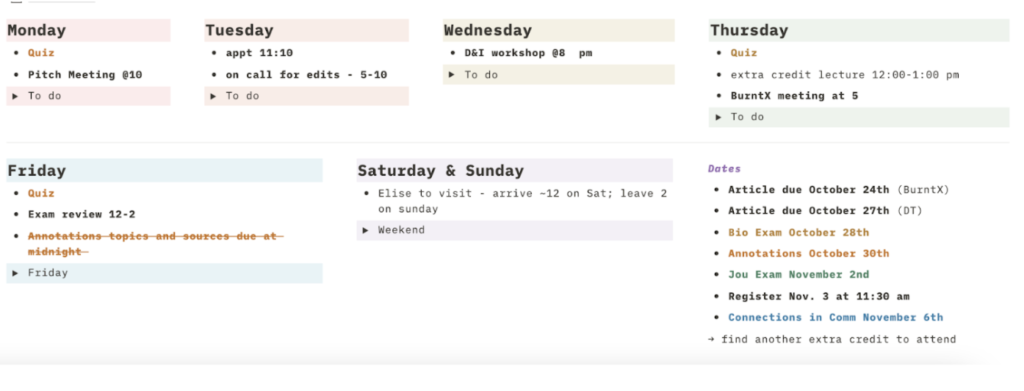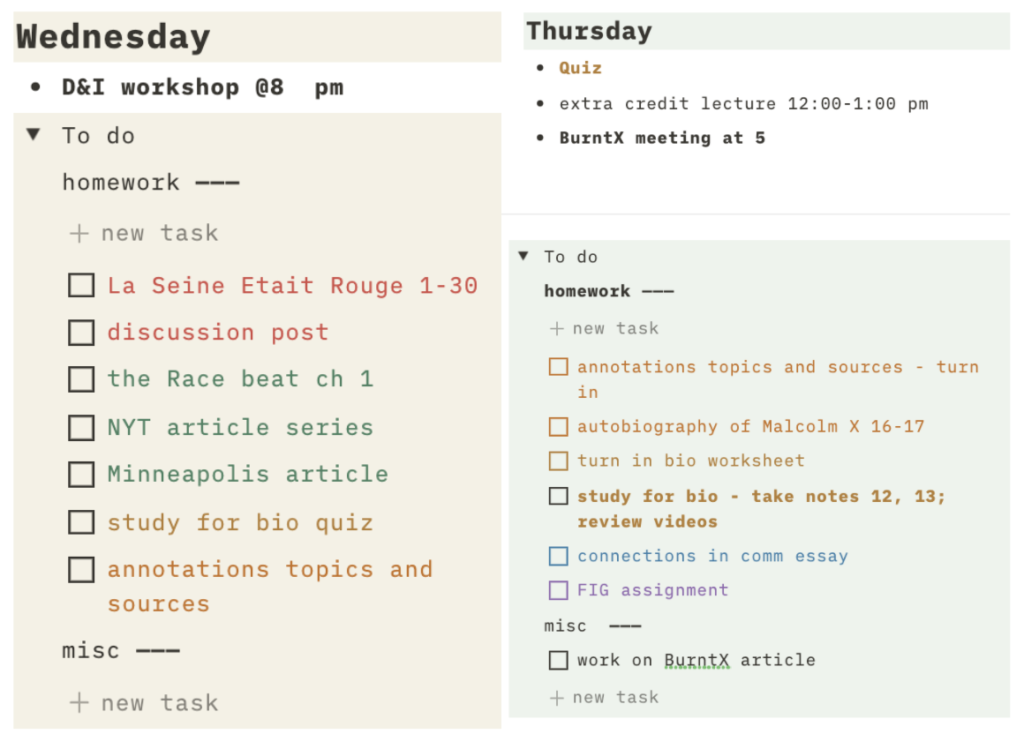If you had an existential crisis surrounded by piles of papers during midterm season, chances are you weren’t the only one. In light of the many projects and tests, students were forced to confront their pre-existing organizational habits. If your current strategies aren’t working for you, here are some tips for how to get organized for the second half of the semester.
There’s no feeling quite like checking off a box on a to-do list, so I use multiple different organizational tools including a bullet journal, a calendar and notion. To standardize my organizational process I’ll start each semester by making a key so that each class has an assigned color.
As soon as I receive my course syllabi, I write down all of my assignments on a wall calendar on the day they are due so I have a general sense of assignments. To avoid clutter, I write “exam” or “paper” in the prescribed subject color without adding other details. I keep the current month’s and next month’s calendar on my wall so that I can easily access them to see any upcoming assignments.
When looking at my calendar, I typically start to put assignments on my radar about three weeks before they’re due. When I notice something coming up, I’ll review the instructions on canvas to see exactly what the project entails. Depending on the assignment, I’ll allocate more or less time to work on or prepare for it. For example, I started working on my French midterm well over three weeks in advance, whereas I can complete some of my communications assignments the day before they’re due.
I’m the kind of person who likes to work on assignments a little bit per day and write multiple drafts of a paper before finally being satisfied, so I always find starting assignments earlier than necessary is helpful. With these upcoming assignments, I’ll start to put aside time to work on them. typically 15 to 30 minutes a day at first, and then larger chunks of time closer to the due date. That way, I won’t have an entire paper to do the day before the due date.
If you have a class in which you do multiple of the same type of assignment, as the semester progresses, you can use your previous experience to determine how much time you’ll realistically need to complete the assignment. For example, in my UGS class we have three research assignments, so for the second one I was able to better gauge how much time it’d take me to finish it.
For repetitive events like weekly quizzes, I find it helps me to set up a specific time each week to study so that I don’t forget and can also set aside the optimal time to study. For my biology quizzes Thursday morning, I always study Wednesday nights so that the material is fresher in my mind.
Every Sunday evening, I’ll transfer events from my calendar to my notion page, which I find is a helpful organizational tool. I’ll add any due dates or assignments with time stamps, as well as any other meetings or plans.

Keeping all of my due dates in one place gives me a good sense of how my week is going to go. Under the events of each day I keep a to-do list. I generally add items onto the to-do list the day of or the night before, because writing things down helps set my intentions for the day.
I tend to do more concrete homework, such as readings, the night after class. Getting ahead on readings ends up confusing me, particularly for classes that have reading quizzes, which is why I do them right after they’re assigned. Most of my classes are on Mondays and Wednesdays, so I typically spend Monday and Wednesday nights doing homework for those classes. Because I have more free time on Tuesdays and Thursdays, I devote time to projects and essays.

On days where I’m working on more projects, I’ll seperate my time into different chunks so that I don’t get too invested in one project. I’m the kind of person who’ll finish an assignment a month before it’s due to procrastinate studying for a quiz, so I found that these time chunks allow me to balance doing what I like and prioritizing work. When scheduling time, sometimes I have to readjust, which is okay! If I have reading that has to get done, I’ll finish it regardless of if it runs over time, but if I’m working on an essay due in a couple of weeks, I’ll stop after the allotted time.
Although staying organized is helpful in the long run, being proactive can lead to overworking yourself or burn-out if you’re not careful. Make sure that you’re taking time for self-care, and giving yourself breaks and time to have fun!
While these tips have helped me stay organized my first semester of college, certain strategies will work better for different people. Knowing your assignments and when they’re due is the most important thing — from there you can decide how you want to tackle working on them. Whether with a calendar, sticky-notes or other organizational tools, it’s never too late to get organized!
Featured image by Alyssa Lindblom
